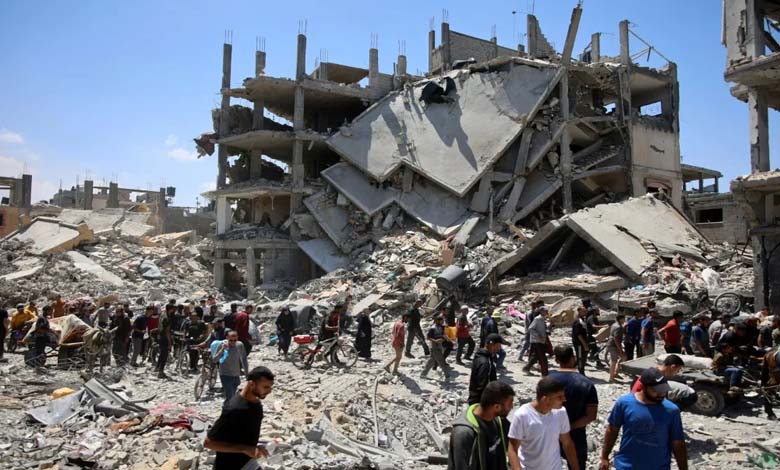Growing international opposition to Israel’s plan to occupy Gaza

The United Nations Security Council will hold a meeting on Sunday to discuss Israel’s plan amid UN warnings of a dangerous escalation and calls for its immediate halt due to violations of international law.
The Israeli security cabinet’s decision to approve a large-scale military plan to take control of the Gaza Strip has drawn widespread international condemnation from various actors worldwide.
-
What Is the Fate of the Gaza Truce? Hamas Responds to Witkoff
-
Gaza Truce : Just 200 Meters Separate Israel and Hamas
The plan aims to occupy Gaza City by displacing its residents to the south, advancing into residential areas, and then moving on to occupy refugee camps. The UN has warned that 87 percent of the enclave is already under occupation or evacuation orders, and that any further military expansion would have “catastrophic” consequences.
Foreign ministers of Australia, Germany, Italy, New Zealand, and the United Kingdom issued a joint statement condemning Israel’s decision. They stressed that such an attack would worsen the humanitarian crisis, endanger the lives of hostages, and could lead to mass displacement and violations of international humanitarian law.
-
How the Muslim Brotherhood Serves Netanyahu Under the Guise of Solidarity with Gaza
-
From the Battlefield to the Therapist’s Office: Gaza Haunts Israeli Soldiers Without Firing a Bullet
These countries called for a permanent ceasefire and the delivery of aid, viewing the two-state solution as the only path to peace, provided that Hamas is disarmed and the Palestinian Authority assumes a leading role.
Meanwhile, the UN Security Council will meet on Sunday to discuss Israel’s plan to seize Gaza City, according to three diplomatic sources cited by AFP on Friday. Initially set for Saturday, the meeting was postponed to Sunday.
Scheduled for 10:00 a.m. (2:00 p.m. GMT) at the request of several council members, the meeting comes amid mounting global concern over Israel’s plan. The Panamanian mission, which chairs the council this month, provided no details, but since Saturday is a Jewish holiday, Israel is expected to participate in the discussions.
-
Signed by Over 100 Journalists: International Petition to Break Gaza War Blackout
-
Diaries of a Gaza family: waking up hungry and sleeping on broken hope
Earlier, UN Secretary-General António Guterres, through his spokesperson, warned Israel of a “dangerous escalation” that could “worsen the catastrophic consequences facing millions of Palestinians.”
The meeting request was welcomed by the Palestinian mission to the UN.
Prime Minister Benjamin Netanyahu’s order for the Israeli army to take control of Gaza City to “defeat” Hamas has sparked outrage worldwide.
Guterres warned that this move could cause “more forced displacement, deaths, and large-scale destruction, further deepening the unimaginable suffering of Palestinians in Gaza.”
-
Hungry in Gaza: When Chaos Devours the Loaf of Life
-
Gaza’s Humanitarian Crisis Shifts Western Diplomacy Toward Recognizing Palestine
UN High Commissioner for Human Rights Volker Türk called for the immediate halt of Israel’s plan “to fully militarily control the occupied Gaza Strip.”
He said it “violates the International Court of Justice’s ruling that Israel must end its occupation as soon as possible, achieve an agreed two-state solution, and uphold the Palestinians’ right to self-determination.”
Hamas declared on Friday that the plan amounts to “a full-fledged war crime” threatening the lives of “about one million people” and meaning “the sacrifice” of hostages held in the besieged territory.
-
Worst-case famine scenario: UN report warns of humanitarian catastrophe in Gaza
-
Gaza Truce : Just 200 Meters Separate Israel and Hamas
In a statement, the movement said: “What the Zionist ministerial council approved, in plans to occupy Gaza City and expel all its residents, constitutes a complete war crime,” adding that it is “a continuation of genocide, forced displacement, and brutal practices amounting to ethnic cleansing.” Hamas warned “the criminal occupier” that “this criminal adventure will come at a heavy price and will not be a walk in the park.”
Arab and Islamic states and organizations also rejected Israel’s decision to fully occupy Gaza, calling for international intervention and describing the measure as “a continuation of genocide and a violation of international law.”
-
“I can’t walk anymore”: When journalists, the hungry, and medics collapse in Gaza
-
From Displacement Camps to UN Facilities: In Gaza, No One Is Spared
The United Arab Emirates voiced “its strongest condemnation and deep denunciation” of the decision, warning of “catastrophic consequences,” including more civilian casualties and worsening humanitarian suffering. They urged the international community, the UN, and the Security Council to fulfill their responsibilities and end these illegal practices that contravene international law.
Saudi Arabia also strongly condemned the decision, denouncing “Israel’s deliberate starvation crimes, brutal practices, and ethnic cleansing against the Palestinian people.”
-
Largest Emirati Aid Ship Heads to Gaza to Save Thousands from Hunger
-
“I pretended to be dead to survive”: How Gaza’s breadlines turned into graveyards
Riyadh warned that the continued inability of the international community and the Security Council to stop Israel’s attacks would undermine the foundations of the international system and legitimacy, threatening regional and global peace and security.
Kuwait expressed “its categorical rejection” of the decision, calling it a “flagrant violation of international law and international humanitarian law,” and said it undermines the prospects for a two-state solution and the creation of a Palestinian state along the 1967 borders with East Jerusalem as its capital.
Egypt also strongly condemned the decision, saying it aims to “entrench the illegal Israeli occupation, continue the genocide in Gaza, and eliminate any prospect of a Palestinian state.”
-
Gaza Truce: U.S. Positive Signal, Israeli Flexibility and a U.N. Alarm
-
Buffer zone or bargaining chip? What you need to know about Gaza’s new Magin Oz corridor
It warned that Israel’s ongoing policy “will only fuel conflict, deepen hatred, and spread extremism.”
Jordan stated that the plan represents “a serious breach of international law and a clear obstacle to the two-state solution, as well as to the Palestinian people’s inalienable right to establish their independent state along the 1967 borders with East Jerusalem as its capital.”
The statement affirmed “the Kingdom’s rejection and strong condemnation of this plan, which constitutes an extension of the extremist Israeli government’s policy of using starvation and blockade as a weapon against the Palestinian people.”
-
Gaza Truce: Israel Loosens Its Red Lines and Steps Back on Morag Corridor
-
Bloody Morning in Gaza: 31 Killed in Israeli Strikes Including Women and Children
Iraq’s Ministry of Foreign Affairs expressed, in a statement, “its strongest condemnation” of the Israeli plan, describing it as “a flagrant violation of international law and international humanitarian law.”
Iraq reiterated its rejection “of this escalatory plan,” describing it as the continuation of a policy of starvation, forced displacement, and mass killing practiced by the Israeli occupation against innocent civilians in Gaza, stressing that these are “war crimes warranting international accountability.”
Qatar’s Ministry of Foreign Affairs stated, in a communiqué, “Doha’s strongest condemnation of the decision by the Israeli occupation authorities to fully occupy the Gaza Strip.”
-
To Resolve the Gaza Truce Deadlock: A New Map on Netanyahu’s Table
-
Stalled Gaza Truce Talks… The Israeli Withdrawal Map Sparks Fresh Tensions
It deemed the decision “a dangerous development that portends a worsening of the humanitarian crisis caused by the ongoing war in the enclave, doubling its catastrophic consequences, and undermining efforts to reach a permanent ceasefire” in the territory.
The Qatari ministry stressed “the necessity for the international community to assume its legal and moral responsibilities, and to act urgently to prevent the Israeli occupation authorities from implementing this decision, and to firmly confront their continuous violations of international humanitarian law and international legitimacy resolutions.”
It further emphasized the need to counter internationally Tel Aviv’s “use of food as a weapon of war and starvation against civilians,” calling for binding Israel to ensure the safe, sustainable, and unhindered entry of humanitarian aid into the Gaza Strip.
-
Aid in Gaza: A Struggle for Survival
-
Gaza Ceasefire Deal: Internal and Regional Pressures Shape the Limits of the Agreement
The ministry reaffirmed Qatar’s “firm and constant position” in support of the Palestinian cause and the steadfastness of the Palestinian people, based on international legitimacy resolutions and the two-state solution, ensuring the establishment of an independent Palestinian state along the 1967 borders with East Jerusalem as its capital.
The Organization of Islamic Cooperation, for its part, strongly condemned the Israeli decision, calling it “an escalation in the series of crimes of genocide, destruction, starvation, forced displacement, and siege imposed by Israel on the Gaza Strip.”
-
2 Million Palestinians in 15% of Gaza’s Area… 36,000 People per Square Kilometer
-
Palestinian political analyst: Gaza’s humanitarian situation is catastrophic and international pressure falls short of addressing the crisis
It asserted that “these crimes represent a flagrant violation of international humanitarian law” and called on the UN Security Council “to act immediately and decisively to impose a comprehensive and permanent ceasefire, ensure the unobstructed and sufficient entry of humanitarian aid and essential needs throughout the Gaza Strip, and provide effective international protection for the Palestinian people.”
Gulf Cooperation Council Secretary-General Jasem Al-Budaiwi stated that “the occupation’s decision represents a blatant challenge to the will of the international community and a flagrant violation of all UN resolutions and international laws.”
-
Latest Gaza News: Death Creeps Westward, Israel Issues Warning to Residents of 18 Areas
-
Palestinian Political Analyst: The Occupation is Deliberately Strangling Gaza… and the International Community Fails to Act
In a statement, he stressed that “this dangerous escalation undermines all efforts aimed at achieving a just and comprehensive peace” and urged the international community “to intensify its efforts and take urgent and effective measures to pressure the Israeli occupation forces to stop their serious and systematic violations, and to provide international protection for the Palestinian people.”
Arab League Secretary-General Ahmed Aboul Gheit expressed “the strongest rejection and condemnation of the plan to reoccupy the Gaza Strip, place it under Israeli control, displace the residents of Gaza City, and confine most of the enclave’s population to a narrow area in the south.”
-
Gaza Latest: 31 Killed by Israeli Fire Near Aid Center
-
U.S. Proposal on Gaza on Hamas’ Table… Talk of a Possible Breakthrough
He stated that “the Arab League has repeatedly warned of the danger of leaving Israel free rein to wage its criminal, insane war against the Palestinian people with the aim of eliminating their cause and destroying them as a national group,” stressing that “the time has come for a firm international stance to end this bloody series of events.”
Aboul Gheit considered the plan to occupy Gaza “a true reflection of Israel’s intentions and objectives since the start of the war, namely to fully reoccupy the territory and expel as many of its residents as possible, a move the Arab side totally and categorically rejects, along with the entire world.”
-
Gaza Latest: Evacuation Orders in the North and Humanitarian Ship Intercepted at Sea
-
Gaza Foundation: Potential U.S. Funding Could Entangle Washington in Aid Chaos
The Arab Parliament also condemned the Israeli decision to reoccupy the Gaza Strip, calling it “an aggressive step that constitutes a flagrant violation of international law and international legitimacy resolutions.”
It stated that “this dangerous decision disregards all efforts to achieve a ceasefire and open a serious political path leading to an end to the occupation and the establishment of an independent Palestinian state with Jerusalem as its capital, and represents a continuation of the policy of genocide, starvation, and forced displacement practiced by the occupation against the Palestinian people in Gaza and the West Bank.”
-
The Story of Two Grandchildren May Reopen the Genocide File in Gaza… Will France Take Action?
-
Latest Gaza News: 15 Killed While Waiting for Aid, Israel Acknowledges Incident
The Arab Parliament called on the international community “to assume its legal and humanitarian responsibilities, to exert immediate pressure on the occupation to end its aggression, reject this unlawful decision, work to provide international protection for the Palestinian people, and prevent any attempt to impose a new colonial reality by force.”
On Friday, Turkey urged the international community to stop the Israeli plan, warning it would constitute “a severe blow” to peace and security. In a statement, the Turkish Ministry of Foreign Affairs said: “We call on the international community to assume its responsibilities to prevent the implementation of this decision, which aims to forcibly displace Palestinians from their land.”
These broad international condemnations reflect a consensus on rejecting the Israeli plan and its catastrophic impact on the humanitarian situation in Gaza, as well as growing calls for the international community to act swiftly and firmly to stop this escalation.












